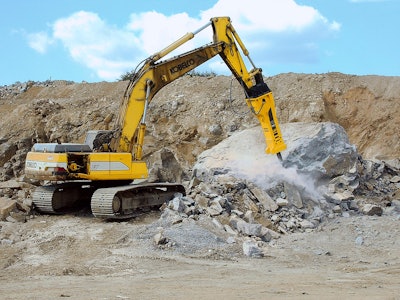Hydraulic Breaker: The Ultimate Tool for Heavy-Duty Demolition
Hydraulic Breaker: The Ultimate Tool for Heavy-Duty Demolition
Blog Article
Hydraulic breakers are powerful tools widely used in construction, demolition, mining, and quarrying. They are designed to break through tough materials like concrete, rocks, and asphalt with high efficiency and precision. This article will cover everything you need to know about hydraulic breakers, including their uses, benefits, and how they work, all explained in simple language.
What is a Hydraulic Breaker?
A hydraulic breaker (also known as a hydraulic hammer) is an attachment typically used on excavators or skid-steer loaders. It converts hydraulic energy from the machine into mechanical energy, creating a powerful impact force that can break through hard surfaces. These tools are commonly used for tasks such as breaking up concrete slabs, demolishing buildings, or removing rocks in mining operations.
How Does a Hydraulic Breaker Work?
Hydraulic breakers operate by using the hydraulic system of the machine to generate pressure. This hydraulic pressure is then used to move a piston within the breaker, creating a powerful blow or impact. The repeated force of the piston hitting the material causes it to fracture and break apart.
Key Components of a Hydraulic Breaker
Piston: The moving part inside the breaker that delivers the impact force.
Chisel or Tool Bit: The pointed or flat piece at the end of the breaker that makes contact with the material.
Accumulator: Stores hydraulic energy and helps to smooth out pressure fluctuations for a more consistent performance.
Housing: Protects the internal components of the breaker and reduces noise and vibration during operation.
Applications of Hydraulic Breakers
Hydraulic breakers are versatile tools used in various industries for multiple purposes. Here are some common applications:
1. Construction and Demolition
Hydraulic breakers are widely used in the construction industry to demolish old structures, break up concrete foundations, and clear debris. They make the demolition process faster and more efficient, saving time and labor costs.
2. Road Maintenance
In road construction, hydraulic breakers are used to break through asphalt and concrete surfaces when laying new roads or repairing damaged ones. They help in quickly removing old pavement layers, allowing for smoother and faster road repairs.
3. Mining and Quarrying
In the mining and quarrying industry, hydraulic breakers are essential for breaking large rocks and extracting minerals. They are used to reduce the size of rocks into smaller, manageable pieces, making the excavation process more efficient.
4. Landscaping
Hydraulic breakers are also used in landscaping projects to break through rocky soil, remove tree stumps, or create pathways and foundations in gardens or parks.
Benefits of Using a Hydraulic Breaker
Hydraulic breakers offer several advantages that make them an essential tool in heavy-duty applications:
1. High Efficiency and Power
Hydraulic breakers deliver powerful blows, allowing them to break through even the toughest materials like concrete, rock, and asphalt. Their high impact force makes them more efficient than traditional methods, such as using jackhammers or manual tools.
2. Versatility
One of the greatest benefits of hydraulic breakers is their versatility. They can be attached to different machines, like excavators, backhoes, or skid-steer loaders, making them suitable for various jobs and applications.
3. Cost-Effective
Using a hydraulic breaker can significantly reduce labor costs and time spent on demolition or excavation tasks. Its efficiency means faster project completion, which leads to lower operational costs.
4. Durability and Low Maintenance
Hydraulic breakers are built to withstand harsh working conditions and deliver long-lasting performance. With proper maintenance, they have a long lifespan, reducing the need for frequent repairs or replacements.
Tips for Choosing the Right Hydraulic Breaker
Selecting the right hydraulic breaker for your needs is important to ensure optimal performance. Here are some factors to consider when choosing a hydraulic breaker:
Machine Compatibility: Make sure the hydraulic breaker is compatible with your machine, whether it's an excavator, skid-steer loader, or backhoe.
Size and Power: Choose a breaker that matches the size of your machine and the type of material you'll be working with. Heavier materials require more powerful breakers.
Tool Bit Type: Different tool bits are available for specific tasks, such as chisels for breaking concrete or pointed tips for cracking rocks.
Quality and Durability: Invest in a high-quality hydraulic breaker from a reputable manufacturer to ensure long-term reliability and performance.
Maintenance Tips for Hydraulic Breakers
Proper maintenance is crucial for the longevity and efficiency of your hydraulic breaker. Here are some tips to keep your breaker in top condition:
Regular Inspection: Check the breaker for wear and tear, loose bolts, and any signs of damage before and after use.
Lubrication: Keep the tool bit and the internal parts of the breaker well-lubricated to prevent excessive friction and overheating.
Replace Worn Parts: Replace worn-out tool bits or damaged components promptly to avoid further damage and ensure consistent performance.
Clean After Use: Clean the hydraulic breaker after each use to remove dirt, debris, and any contaminants that could affect its performance.
Conclusion
Hydraulic breakers are powerful, efficient, and versatile tools essential for demolition, excavation, and construction projects. They offer high impact force, durability, and cost-effective performance, making them a valuable addition to any heavy-duty machinery fleet. By choosing the right hydraulic breaker and maintaining it properly, you can enhance productivity and extend the lifespan of your equipment. Whether you are breaking through concrete, removing rocks, or clearing debris, a hydraulic breaker is the perfect tool for the job.
Check this video:
Report this page